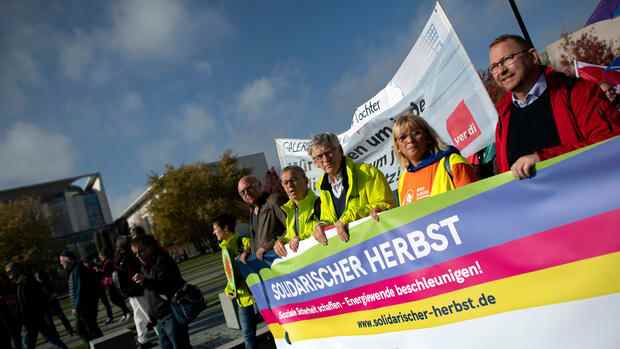“Without an upper limit, high-income households will be reimbursed thousands of euros that really don’t need it.”
(Photo: Stefan Boness/Ipon)
Berlin Industry and trade unions are calling on the federal government to quickly launch the bridging and hardship aid for consumers and companies proposed by the Gas and Heat Expert Commission.
The aid fund to protect tenants and owners of owner-occupied properties must be set up promptly because it is intended to bridge the gap until the gas price brake takes effect in March 2023, Verdi boss Frank Werneke told the Handelsblatt.
“There is still a lot of emphasis required,” emphasized the trade unionist, who himself belonged to the expert commission that presented its final report on Monday.
The aid fund is intended to support tenants and owners of owner-occupied properties who, despite a one-off payment and a gas price cap, are unable to bear their energy costs.
Top jobs of the day
Find the best jobs now and
be notified by email.
The Commission suggests launching it for the period from January 2023 to the end of April 2024. If landlords make advance payments for their tenants in the event of extreme price increases, they should be able to receive interest-free liquidity support from the fund.
The German Confederation of Skilled Crafts (ZDH) also demands speed – in the case of hardship program for the economy suggested by the Commission. Based on the help during the corona pandemic, the experts propose loans and grants for companies to bridge the time until the gas price brake takes effect.
“Especially in our energy-intensive handicraft businesses, the hut is burning,” said ZDH President Hans Peter Wollseifer. “Our companies definitely have no time to lose, which is why it is so urgent to implement the measures very quickly if we want to avoid numerous companies finally going to the knees.”
“Especially in our energy-intensive handicraft businesses, the hut is burning.”
(Photo: dpa)
Like the experts from the Gas Commission, Wollseifer also assumes that gas prices will not drop to the pre-crisis level in the foreseeable future. That is why politicians must also find support solutions for companies that are not satisfied with the relief from gas and electricity price brakes and who will be overwhelmed by the “new normal” high energy prices.
>> Read here: Details from the Gas Commission’s final report: These requirements apply to companies receiving state aid
The Commission is also suggesting solutions for providers of social services, such as clinics and nursing home operators. They cannot easily implement the political requirement to save 20 percent energy because they cannot leave patients and residents out in the cold.
Here too, according to the experts, there should be an aid fund “appropriately” funded by the social security agencies. But here you can quickly reach a double-digit billion amount, “which the health and nursing care insurance companies cannot also raise,” said Verdi boss Werneke.
The trade unionist also recommends that politicians include an upper limit for subsidized consumption in the planned gas price brake for households. According to the final report, the Commission proposed examining such an upper limit because it was “necessary for a more socially balanced design of the gas price brake”.
MPs from the SPD and the Greens had warned that otherwise easy to save gas consumption, for example for heating private pools, could be subsidized. “Without an upper limit, high-income households will be reimbursed thousands of euros that really don’t need it,” warned Verdi boss Werneke.
More: Inflation is about understanding the disease, not just the symptoms – One Comment
